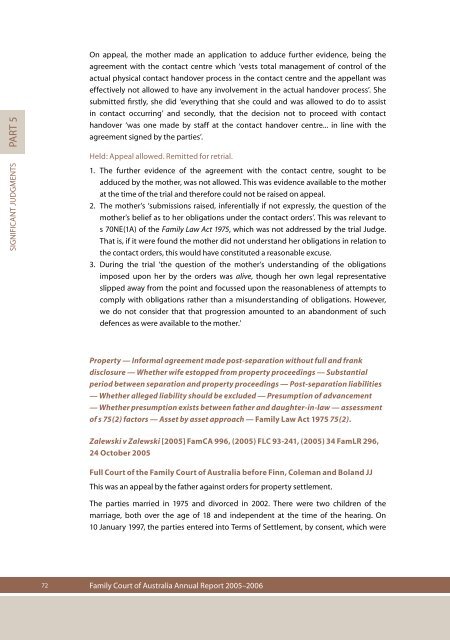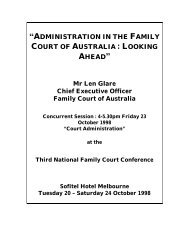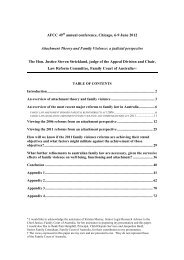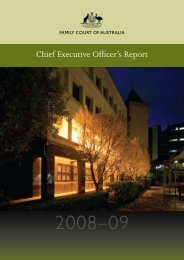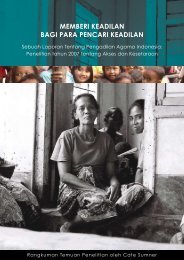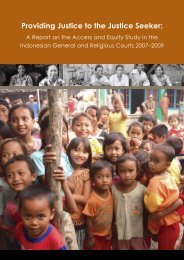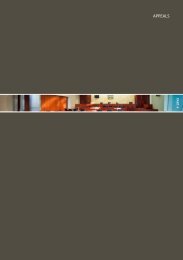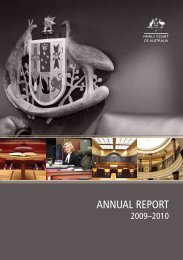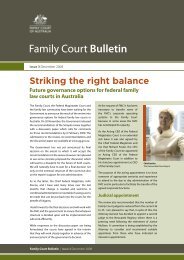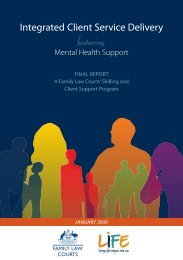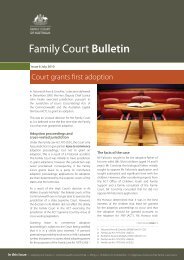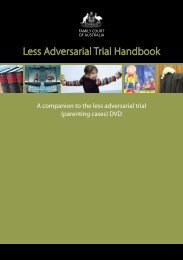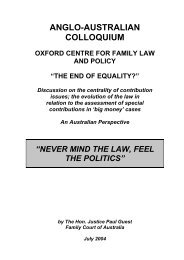View a full copy of this report (PDF Size - 3.69 MB) - Family Court of ...
View a full copy of this report (PDF Size - 3.69 MB) - Family Court of ...
View a full copy of this report (PDF Size - 3.69 MB) - Family Court of ...
You also want an ePaper? Increase the reach of your titles
YUMPU automatically turns print PDFs into web optimized ePapers that Google loves.
SIGNIFICANT JUDGMENTS Part 5<br />
On appeal, the mother made an application to adduce further evidence, being the<br />
agreement with the contact centre which ‘vests total management <strong>of</strong> control <strong>of</strong> the<br />
actual physical contact handover process in the contact centre and the appellant was<br />
effectively not allowed to have any involvement in the actual handover process’. She<br />
submitted firstly, she did ‘everything that she could and was allowed to do to assist<br />
in contact occurring’ and secondly, that the decision not to proceed with contact<br />
handover ‘was one made by staff at the contact handover centre... in line with the<br />
agreement signed by the parties’.<br />
Held: Appeal allowed. Remitted for retrial.<br />
1. The further evidence <strong>of</strong> the agreement with the contact centre, sought to be<br />
adduced by the mother, was not allowed. This was evidence available to the mother<br />
at the time <strong>of</strong> the trial and therefore could not be raised on appeal.<br />
2. The mother’s ‘submissions raised, inferentially if not expressly, the question <strong>of</strong> the<br />
mother’s belief as to her obligations under the contact orders’. This was relevant to<br />
s 70NE(1A) <strong>of</strong> the <strong>Family</strong> Law Act 1975, which was not addressed by the trial Judge.<br />
That is, if it were found the mother did not understand her obligations in relation to<br />
the contact orders, <strong>this</strong> would have constituted a reasonable excuse.<br />
3. During the trial ‘the question <strong>of</strong> the mother’s understanding <strong>of</strong> the obligations<br />
imposed upon her by the orders was alive, though her own legal representative<br />
slipped away from the point and focussed upon the reasonableness <strong>of</strong> attempts to<br />
comply with obligations rather than a misunderstanding <strong>of</strong> obligations. However,<br />
we do not consider that that progression amounted to an abandonment <strong>of</strong> such<br />
defences as were available to the mother.’<br />
Property — Informal agreement made post-separation without <strong>full</strong> and frank<br />
disclosure — Whether wife estopped from property proceedings — Substantial<br />
period between separation and property proceedings — Post-separation liabilities<br />
— Whether alleged liability should be excluded — Presumption <strong>of</strong> advancement<br />
— Whether presumption exists between father and daughter-in-law — assessment<br />
<strong>of</strong> s 75(2) factors — Asset by asset approach — <strong>Family</strong> Law Act 1975 75(2).<br />
Zalewski v Zalewski [2005] FamCA 996, (2005) FLC 93-241, (2005) 34 FamLR 296,<br />
24 October 2005<br />
Full <strong>Court</strong> <strong>of</strong> the <strong>Family</strong> <strong>Court</strong> <strong>of</strong> Australia before Finn, Coleman and Boland JJ<br />
This was an appeal by the father against orders for property settlement.<br />
The parties married in 1975 and divorced in 2002. There were two children <strong>of</strong> the<br />
marriage, both over the age <strong>of</strong> 18 and independent at the time <strong>of</strong> the hearing. On<br />
10 January 1997, the parties entered into Terms <strong>of</strong> Settlement, by consent, which were<br />
72<br />
<strong>Family</strong> <strong>Court</strong> <strong>of</strong> Australia Annual Report 2005–2006


